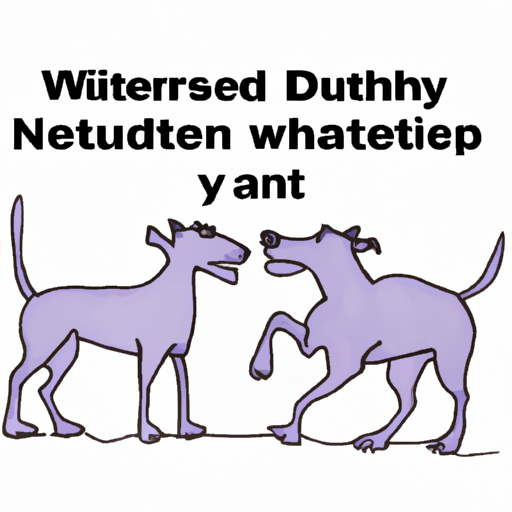As a dog caretaker, it’s likely that you’ve encountered a wide range of behaviors from your canine companions. One behavior that can be particularly perplexing is aggression between neutered and unneutered dogs. Why is it that a dog who has been neutered might display aggression towards a dog who hasn’t been?
The answer lies in a complex mix of hormones, social hierarchy, and individual personality traits. In this article, we will delve into this subject, unpacking the reasons behind this dynamic and providing advice on how to manage it.
Table of Contents
- Understanding Dog Behavior
- The Role of Hormones in Dog Aggression
- Social Hierarchy Among Dogs
- Individual Personality Traits
- Managing Aggression in Neutered Dogs
- FAQs
Key Takeaways
- The behavior of dogs, neutered or unneutered, can be influenced by a combination of hormonal changes, social hierarchy, and individual personality traits.
- Neutered dogs might display aggression towards unneutered dogs due to differences in scent, perceived threat to social hierarchy, or personal temperament.
- Understanding these triggers can help dog owners and caretakers manage aggression effectively.
Understanding Dog Behavior
To comprehend why neutered dogs might attack unneutered ones, it’s essential to have a basic understanding of dog behavior. Dogs, like their wild ancestor the wolf, are pack animals. This means they naturally form social hierarchies and establish territories.
The American Society for the Prevention of Cruelty to Animals (ASPCA) has a wealth of information on understanding dog behavior. According to them, dogs use a variety of signals and behaviors to establish their place in the pack and communicate with other dogs. These can include body language, vocalizations, and even scent marking.
The Role of Hormones in Dog Aggression
Hormones play a significant role in dog behavior, including aggression. Unneutered dogs, also known as intact dogs, have a higher level of testosterone than neutered dogs. This hormone can influence behaviors associated with dominance and territoriality.
Unneutered dogs also produce a specific scent that can be picked up by other dogs. This scent can signal a potential rival, particularly to a neutered dog, who may feel threatened and respond with aggression.
Social Hierarchy Among Dogs
Social hierarchy is a key factor in dog behavior. In a pack, there is typically an alpha dog, who leads and makes decisions, and lower-ranking dogs, who follow the leader.
A neutered dog might perceive an unneutered dog as a threat to their position in the social hierarchy, especially if the unneutered dog displays dominant behavior. This perceived threat can trigger aggression, as the neutered dog tries to assert its dominance and maintain its status in the pack.
Individual Personality Traits
It’s important to note that not all neutered dogs will react aggressively towards unneutered dogs. Just like humans, dogs have unique personality traits. Some dogs are naturally more submissive, while others may be more assertive or prone to aggression.
Personal temperament can play a significant role in how a neutered dog responds to an unneutered dog. For instance, a neutered dog with a more assertive personality might be more likely to display aggression, while a more submissive neutered dog might not react aggressively.
Managing Aggression in Neutered Dogs
If you’re dealing with aggression from a neutered dog towards an unneutered dog, there are steps you can take to manage this behavior.
First, it can be helpful to have both dogs checked by a veterinarian. Certain health issues can cause or contribute to aggression in dogs.
Second, consider consulting with a professional dog trainer or behaviorist. They can provide strategies for managing aggression, such as obedience training, socialization exercises, or even changes to the dogs’ environment.
Remember, managing aggression in dogs is not about punishment, but about understanding and addressing the underlying issues. For more insights into managing dog aggression, check out this article from One Top Dog.
FAQs
Why does my neutered dog attack my unneutered dog?
Your neutered dog might perceive your unneutered dog as a threat to their position in the social hierarchy, especially if the unneutered dog displays dominant behavior. Hormones can also play a role, as unneutered dogs produce a scent that can signal a potential rival to neutered dogs.
How can I prevent aggression between my neutered and unneutered dogs?
You can manage aggression by consulting with a professional dog trainer or behaviorist, who can provide strategies such as obedience training, socialization exercises, or changes to the dogs’ environment. It can also be helpful to have both dogs checked by a veterinarian, as certain health issues can cause or contribute to aggression.
Does neutering a dog reduce aggression?
Neutering can reduce aggression in some dogs, particularly aggression driven by hormones. However, it’s not a cure-all for all types of aggression, and it might not have a significant impact on aggression driven by factors like fear or anxiety. You can learn more about the effects of neutering on dog behavior in this post from One Top Dog.
Understanding why neutered dogs may attack unneutered ones is a complex issue, with many factors at play. By understanding the role of hormones, social hierarchy, and individual personality traits, you can better navigate this challenging behavior and ensure a peaceful coexistence between your four-legged friends.



